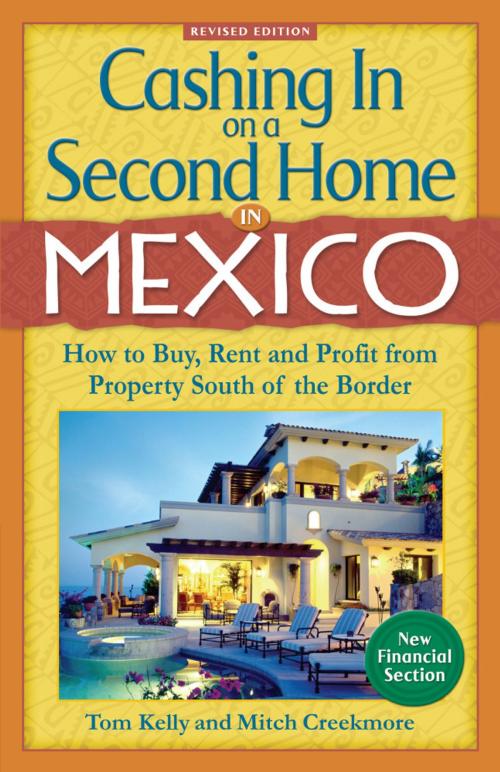Cashing In On a Second Home in Mexico: How to Buy, Rent and Profit from Property South of the Border
Business & Finance, Finance & Investing, Real Estate| Author: | Tom Kelly | ISBN: | 9781456605209 |
| Publisher: | eBookIt.com | Publication: | October 10, 2014 |
| Imprint: | eBookIt.com | Language: | English |
| Author: | Tom Kelly |
| ISBN: | 9781456605209 |
| Publisher: | eBookIt.com |
| Publication: | October 10, 2014 |
| Imprint: | eBookIt.com |
| Language: | English |
After nearly a decade of work in Mexico insuring real estate properties to foreign purchasers, the same issues always seem to surface regarding second home acquisitions:
"If I buy a house in Mexico, don't I get a 99-year lease from the government?"
"I understand that I can buy a residence in Mexico only if the title is vested in a Mexican corporation."
"I didn't think Americans could own Mexican beachfront properties."
All of these suppositions are incorrect. This book attempts to help clarify and explain why Mexican real estate, when using the proper safeguards, can be a terrific, secure investment. It will also explore the purchasing mistakes of the past, summarize several of the attractive new locations that are luring foreign dollars and explain why Mexico is so eager to welcome second home buyers from outside its borders.
The worst thing a potential purchaser can do is to remain ignorant of the law and procedures involved in the conveyance of real estate in a foreign country. As we state several times in this book, Mexico is not the perceived "Wild West" where anything goes and the prevailing Mexican attitude is "trust me, no problema." It is inherently important for non-Mexican buyers to understand that Mexico has formality of law with authorized regulation of real estate development procedures at all levels. This process is coupled with a statutory government framework for the legal conveyance of real property.
Great personal wealth has been attained through real estate ownership, but for most of us, it has been limited to investment in a primary residence. Although Mexican real estate also can be a viable investment venue, Americans have had a great deal more trepidation considering properties "south of the border." And for good reason—considering the history of some acquisitions.
Given today's investment climate, however, Mexico provides an attractive, alternative arena for potential investment. Real estate in Mexico should have a similar appreciation "upside" as does real estate in a U.S. development—coupled with the advantage of use and enjoyment of the property as a vacation residence.
"If I buy a house in Mexico, don't I get a 99-year lease from the government?"
"I understand that I can buy a residence in Mexico only if the title is vested in a Mexican corporation."
"I didn't think Americans could own Mexican beachfront properties."
All of these suppositions are incorrect. This book attempts to help clarify and explain why Mexican real estate, when using the proper safeguards, can be a terrific, secure investment. It will also explore the purchasing mistakes of the past, summarize several of the attractive new locations that are luring foreign dollars and explain why Mexico is so eager to welcome second home buyers from outside its borders.
The worst thing a potential purchaser can do is to remain ignorant of the law and procedures involved in the conveyance of real estate in a foreign country. As we state several times in this book, Mexico is not the perceived "Wild West" where anything goes and the prevailing Mexican attitude is "trust me, no problema." It is inherently important for non-Mexican buyers to understand that Mexico has formality of law with authorized regulation of real estate development procedures at all levels. This process is coupled with a statutory government framework for the legal conveyance of real property.
Great personal wealth has been attained through real estate ownership, but for most of us, it has been limited to investment in a primary residence. Although Mexican real estate also can be a viable investment venue, Americans have had a great deal more trepidation considering properties "south of the border." And for good reason—considering the history of some acquisitions.
Given today's investment climate, however, Mexico provides an attractive, alternative arena for potential investment. Real estate in Mexico should have a similar appreciation "upside" as does real estate in a U.S. development—coupled with the advantage of use and enjoyment of the property as a vacation residence.
After nearly a decade of work in Mexico insuring real estate properties to foreign purchasers, the same issues always seem to surface regarding second home acquisitions:
"If I buy a house in Mexico, don't I get a 99-year lease from the government?"
"I understand that I can buy a residence in Mexico only if the title is vested in a Mexican corporation."
"I didn't think Americans could own Mexican beachfront properties."
All of these suppositions are incorrect. This book attempts to help clarify and explain why Mexican real estate, when using the proper safeguards, can be a terrific, secure investment. It will also explore the purchasing mistakes of the past, summarize several of the attractive new locations that are luring foreign dollars and explain why Mexico is so eager to welcome second home buyers from outside its borders.
The worst thing a potential purchaser can do is to remain ignorant of the law and procedures involved in the conveyance of real estate in a foreign country. As we state several times in this book, Mexico is not the perceived "Wild West" where anything goes and the prevailing Mexican attitude is "trust me, no problema." It is inherently important for non-Mexican buyers to understand that Mexico has formality of law with authorized regulation of real estate development procedures at all levels. This process is coupled with a statutory government framework for the legal conveyance of real property.
Great personal wealth has been attained through real estate ownership, but for most of us, it has been limited to investment in a primary residence. Although Mexican real estate also can be a viable investment venue, Americans have had a great deal more trepidation considering properties "south of the border." And for good reason—considering the history of some acquisitions.
Given today's investment climate, however, Mexico provides an attractive, alternative arena for potential investment. Real estate in Mexico should have a similar appreciation "upside" as does real estate in a U.S. development—coupled with the advantage of use and enjoyment of the property as a vacation residence.
"If I buy a house in Mexico, don't I get a 99-year lease from the government?"
"I understand that I can buy a residence in Mexico only if the title is vested in a Mexican corporation."
"I didn't think Americans could own Mexican beachfront properties."
All of these suppositions are incorrect. This book attempts to help clarify and explain why Mexican real estate, when using the proper safeguards, can be a terrific, secure investment. It will also explore the purchasing mistakes of the past, summarize several of the attractive new locations that are luring foreign dollars and explain why Mexico is so eager to welcome second home buyers from outside its borders.
The worst thing a potential purchaser can do is to remain ignorant of the law and procedures involved in the conveyance of real estate in a foreign country. As we state several times in this book, Mexico is not the perceived "Wild West" where anything goes and the prevailing Mexican attitude is "trust me, no problema." It is inherently important for non-Mexican buyers to understand that Mexico has formality of law with authorized regulation of real estate development procedures at all levels. This process is coupled with a statutory government framework for the legal conveyance of real property.
Great personal wealth has been attained through real estate ownership, but for most of us, it has been limited to investment in a primary residence. Although Mexican real estate also can be a viable investment venue, Americans have had a great deal more trepidation considering properties "south of the border." And for good reason—considering the history of some acquisitions.
Given today's investment climate, however, Mexico provides an attractive, alternative arena for potential investment. Real estate in Mexico should have a similar appreciation "upside" as does real estate in a U.S. development—coupled with the advantage of use and enjoyment of the property as a vacation residence.















